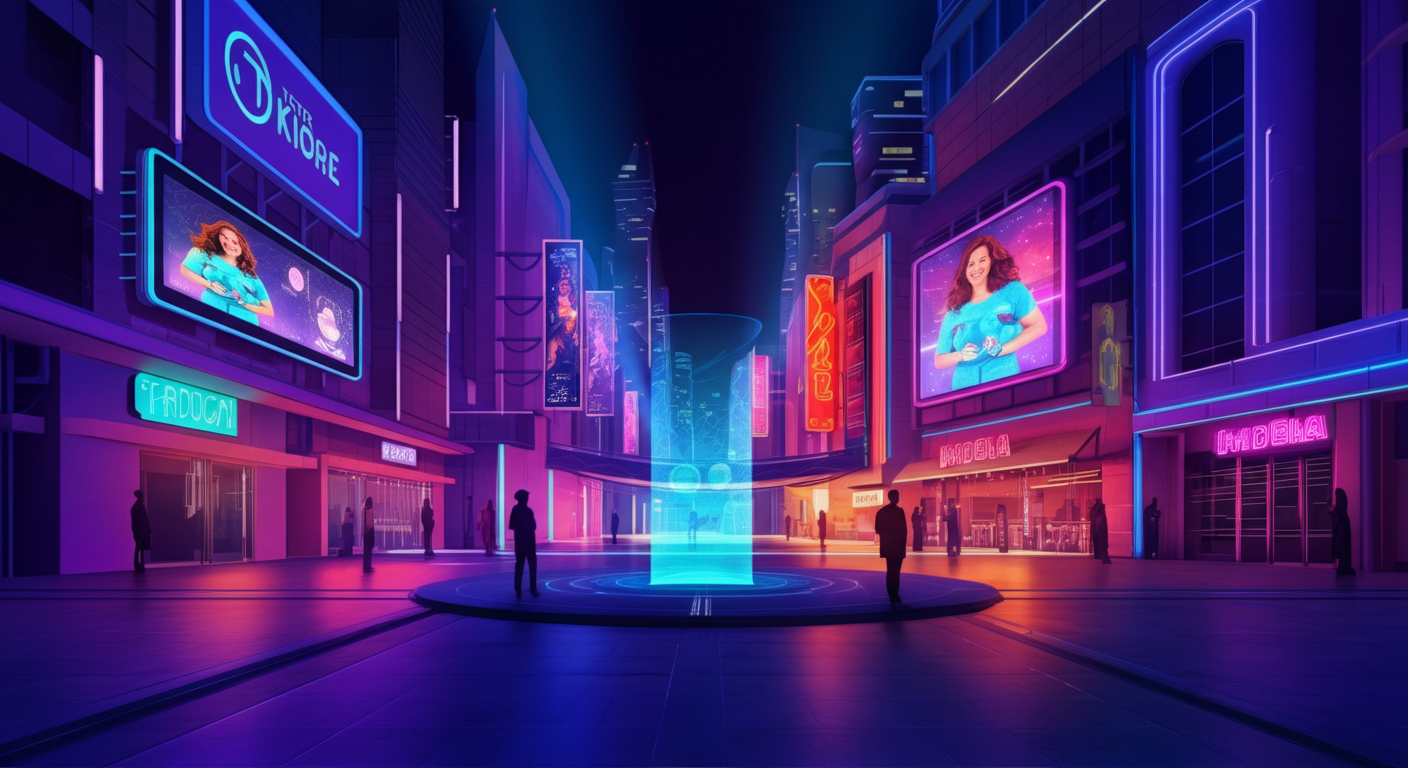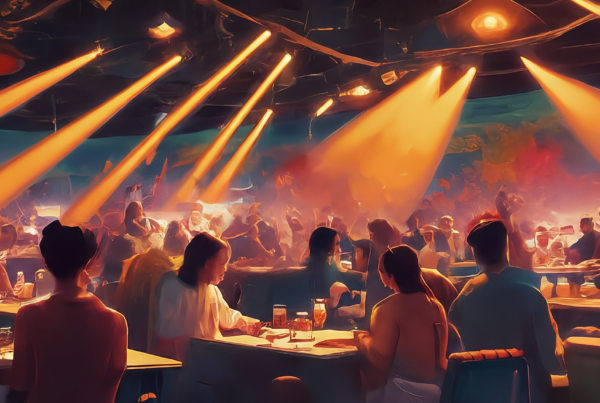As we step into 2025, the world of entertainment technology is on the brink of a revolution. The **2025 Entertainment Tech Trends** are not just about cutting-edge gadgets and eye-catching visuals; they are set to redefine how businesses in the hospitality and entertainment sectors engage with their audiences. Whether you’re managing a bustling casino, a trendy restaurant, or a cozy bar, staying ahead of these trends is crucial to delivering an unforgettable customer experience.
At the heart of these developments lies the integration of **digital signage solutions** and **commercial video programming** that are designed to captivate and retain customer attention. According to Deloitte Insights, the rise of hyperscale social video platforms is reshaping content consumption, presenting both challenges and opportunities for traditional media companies. For businesses seeking to enhance their customer experience, understanding these shifts is vital.
Companies like DLM Media are at the forefront, offering innovative solutions tailored to multi-location organizations looking for centralized entertainment systems. Their commitment to **customer experience enhancement** ensures that businesses can provide a seamless and engaging atmosphere for their patrons. As we explore these trends, we’ll delve into how businesses can leverage these innovations to create a competitive edge.
Join us as we uncover the key **2025 Entertainment Tech Trends**, from the growing influence of generative AI in content creation to the surge in **hospitality TV packages**. Discover how these advancements can transform your business and keep you ahead in the ever-evolving entertainment landscape. Ready to dive in? Let’s explore the future of entertainment technology and its impact on your business strategy.
Emerging Technologies Shaping Entertainment in 2025
The entertainment industry in 2025 is poised for a significant transformation, driven by groundbreaking technologies like AI, VR, and AR. These innovations are not only enhancing viewer experiences but are also creating new business opportunities for companies in the hospitality and entertainment sectors. According to Deloitte, AI is expected to play a pivotal role in content creation and personalization, offering businesses the ability to tailor experiences to individual preferences.
As businesses strive to stay ahead in this rapidly evolving landscape, understanding and implementing these technologies is crucial. From casinos to restaurants, the integration of these advancements can redefine customer engagement and satisfaction. Let’s delve into how these technologies are reshaping the entertainment industry and the potential challenges and opportunities they present.
Artificial Intelligence: The Future of Content Creation
Artificial Intelligence (AI) is revolutionizing the way content is created and consumed. By analyzing viewer data, AI can generate personalized content recommendations, enhancing user engagement and satisfaction. Deloitte highlights that AI’s role in content creation is expanding, with businesses using AI to automate video editing, scriptwriting, and even generating new content formats.
Moreover, AI-driven analytics allow businesses to understand audience preferences more deeply, enabling them to tailor their offerings accordingly. This not only improves customer satisfaction but also opens up new revenue streams through targeted advertising and personalized content delivery.
Virtual Reality: Immersive Experiences Redefined
Virtual Reality (VR) is taking immersive experiences to new heights, offering audiences a chance to engage with content in a more interactive and realistic manner. In 2025, VR is expected to become more mainstream, with businesses in the hospitality sector leveraging it to create unique experiences that differentiate them from competitors.
For instance, casinos can use VR to create virtual gaming environments, while restaurants can offer virtual tours of their kitchens or farms, enhancing transparency and customer trust. However, integrating VR comes with challenges, including high initial costs and the need for specialized equipment, which businesses must navigate to fully capitalize on its potential.
Augmented Reality: Bridging the Digital and Physical Worlds
Augmented Reality (AR) is another technology making waves in the entertainment industry by overlaying digital content onto the physical world. This technology is particularly beneficial for businesses looking to enhance in-person experiences with digital elements.
Restaurants and bars, for example, can use AR to provide interactive menus or virtual wine tastings, enriching the dining experience. Despite its potential, AR implementation requires careful consideration of user experience design and technology integration to ensure seamless interaction between the digital and physical realms.
In conclusion, the integration of AI, VR, and AR in the entertainment industry presents both challenges and opportunities. Businesses that successfully harness these technologies can create more engaging and personalized experiences for their audiences, ultimately driving growth and innovation in the sector. For more insights on how to leverage these technologies, explore our other articles on DLM Media.
The Rise of Interactive and Social Entertainment Platforms
As we navigate the landscape of 2025 Entertainment Tech Trends, interactive and social entertainment platforms are at the forefront of reshaping how audiences consume content. Platforms like TikTok and YouTube are leading this transformation, offering user-generated content that captivates massive audiences worldwide. These platforms have not only changed the way we engage with entertainment but have also challenged traditional media’s dominance.
According to Deloitte Insights, the growing influence of social media in entertainment is undeniable. Social platforms have become a dominant force, leveraging advanced algorithms and user data to deliver personalized content that keeps users engaged. This shift has significant implications for traditional media companies, which must adapt to remain competitive in this evolving landscape.
Impact on Traditional Media
The rise of social platforms has profoundly impacted traditional media, forcing it to rethink its strategies. Traditional media companies are now competing not only with each other but also with social platforms that offer a seemingly endless variety of free content. This has led to increased pressure on traditional media to innovate and find new ways to attract and retain audiences.
Deloitte’s research highlights that social platforms are reshaping content consumption patterns, with younger generations spending more time on platforms like TikTok and YouTube than on traditional TV. This shift in audience behavior is prompting traditional media companies to explore partnerships and collaborations with social platforms to reach broader audiences and tap into new revenue streams.
User-Generated Content: A New Era
User-generated content (UGC) has emerged as a powerful driver of engagement on social platforms. Creators on platforms like YouTube and TikTok produce content that resonates with audiences, often surpassing the reach and influence of traditional media. This democratization of content creation has allowed individuals to build large followings and become influential figures in their own right.
For businesses in the hospitality and entertainment industries, leveraging UGC can be a game-changer. By collaborating with popular creators, businesses can reach new audiences and enhance their brand visibility. This approach not only fosters community engagement but also provides authentic and relatable content that resonates with viewers.
Comparison of Traditional vs. Social Media Platforms
- Content Creation: Traditional media relies on professionally produced content, while social platforms thrive on user-generated content.
- Audience Engagement: Social platforms offer interactive and personalized experiences, whereas traditional media follows a one-way communication model.
- Monetization: Traditional media primarily relies on advertising and subscriptions, while social platforms utilize ad revenue, sponsorships, and creator funds.
In conclusion, the rise of interactive and social entertainment platforms is a key trend to watch in 2025. As these platforms continue to evolve, businesses must adapt and find innovative ways to engage with audiences in this dynamic digital landscape. For more insights on how to leverage these trends, explore our other articles on DLM Media.
Monetization Strategies in the Evolving Entertainment Landscape
The entertainment industry is undergoing a transformation, with businesses exploring innovative monetization strategies to stay competitive. As we move into 2025, companies are increasingly adopting ad-supported models and creating niche content to diversify their revenue streams. These strategies are crucial for businesses in the hospitality and entertainment sectors, such as casinos, restaurants, and bars, aiming to enhance customer experiences and engagement.
According to PwC, the media and entertainment industry’s revenue is projected to surpass $3.4 trillion by 2028, highlighting the potential for growth through strategic monetization. However, navigating this evolving landscape requires a deep understanding of the benefits and challenges associated with different revenue models.
Ad-Supported Models: Benefits and Challenges
Ad-supported models have gained traction as a viable monetization strategy, offering businesses a way to provide free or low-cost content while generating revenue through advertisements. This approach is particularly appealing to younger audiences who are more receptive to ad-supported content. According to Deloitte Insights, social media platforms have become a dominant force in media and entertainment, leveraging advanced algorithms to deliver personalized ad experiences.
However, implementing ad-supported models comes with challenges. Businesses must balance ad frequency and relevance to avoid alienating viewers. Additionally, they need to invest in data-driven technologies to optimize ad placements and enhance user engagement. As PwC notes, companies must focus on creative quality and customer data to maximize returns from ad-supported models.
Niche Content: Targeting Specific Audiences
Creating niche content is another strategy gaining momentum in the entertainment industry. By focusing on specific audience segments, businesses can deliver highly personalized experiences that resonate deeply with viewers. This approach not only enhances customer loyalty but also opens up new revenue opportunities through targeted advertising and premium content offerings.
According to a Goldman Sachs report, the creator economy is projected to reach half a trillion dollars by 2027, underscoring the value of niche content in engaging passionate micro-communities. For businesses in the hospitality and entertainment sectors, leveraging niche content can differentiate their offerings and create a competitive edge in a crowded market.
Comparing Monetization Strategies
| Strategy | Benefits | Challenges |
|---|---|---|
| Ad-Supported Models | Generates revenue through ads, appeals to cost-sensitive audiences | Requires careful ad placement and frequency management |
| Niche Content | Engages specific audience segments, enhances loyalty | Needs investment in content creation and audience analysis |
In conclusion, the evolving entertainment landscape presents both opportunities and challenges for businesses seeking to monetize their content effectively. By adopting ad-supported models and focusing on niche content, companies can diversify their revenue streams and enhance customer engagement. For more insights on leveraging these strategies, explore our other articles on DLM Media.
Embracing the Future of Entertainment Technology
As we look forward to 2025, the entertainment industry stands on the cusp of transformative changes that promise to redefine how audiences engage with content. Businesses in the hospitality and entertainment sectors must stay ahead by embracing emerging technologies, leveraging social platforms, and exploring innovative monetization strategies. These trends are not just about keeping up with the competition; they are about seizing opportunities to create memorable customer experiences and drive growth.
One of the most significant shifts is the integration of AI, VR, and AR in content creation and delivery. These technologies offer unprecedented opportunities for personalization and engagement, allowing businesses to tailor experiences that resonate with individual preferences. As Deloitte Insights highlights, the role of AI in content creation is expanding, offering businesses the ability to automate and innovate in ways that were previously unimaginable.
Moreover, the rise of interactive and social entertainment platforms like TikTok and YouTube is reshaping content consumption patterns. These platforms have become dominant forces, challenging traditional media’s dominance and offering new avenues for audience engagement. Businesses must adapt by leveraging user-generated content and collaborating with creators to reach new audiences and enhance brand visibility.
- Embrace emerging technologies: Integrate AI, VR, and AR to enhance personalization and engagement.
- Leverage social platforms: Collaborate with creators and utilize user-generated content to reach broader audiences.
- Innovate monetization strategies: Adopt ad-supported models and create niche content to diversify revenue streams.
In this dynamic landscape, staying informed about the latest 2025 Entertainment Tech Trends is crucial. We encourage you to explore more content on our website, DLM Media, to discover how these trends can transform your business strategy. Share your thoughts in the comments below, and don’t forget to connect with us on social media to stay updated on the latest industry insights.





